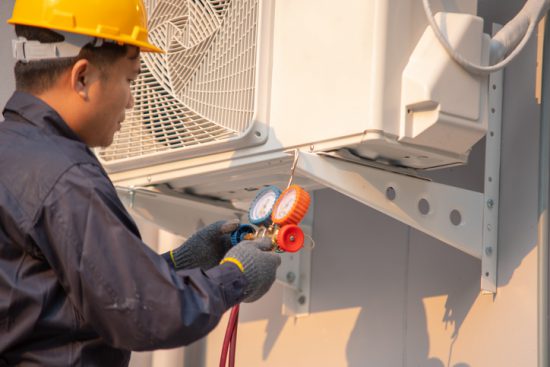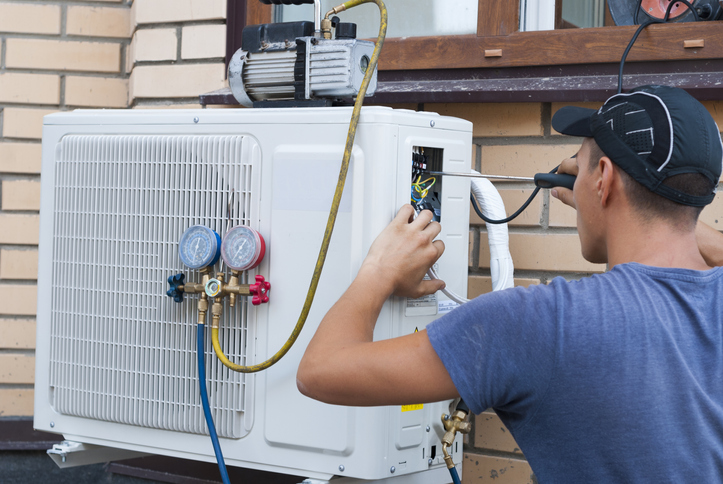If You’re Enrolled in HVAC Technician Courses, Discover 5 Signs of Low Refrigerant in a System
October 07, 2021
If you’re considering becoming an HVAC technician, you’ll be launching a career as an expert in the field of heating, ventilation, and air conditioning systems. Your expertise will enable you to perform services for clients such as installing HVAC systems, maintaining and repairing the systems, and troubleshooting problems within these systems. When servicing air conditioning systems during your career, one of the most common problems you may encounter is a low level of refrigerant within the system.
Refrigerant, a compound which absorbs heat from the surrounding environment, is essential to the smooth operation of an AC system. Within an AC system, refrigerant is stored inside copper coils–taking in heat from the air in a home or other indoor space. The refrigerant is then distributed through the condenser and compressor, where it is converted from liquid to gas to liquid. The resulting hot air is blown outside, while another fan blows air over the cold coils containing the refrigerant and into the building. Given the importance of refrigerant in the distribution of cold air, when refrigerant levels are low, an AC system’s performance will be negatively affected.
When refrigerant levels are low, it’s typically either due to a leak, or because the AC system was installed incorrectly. During your career as an HVAC technician, becoming familiar with the signs of low refrigerant in an AC system will help you to successfully identify and repair related issues before greater damage ensues. Below, discover five common signs of low refrigerant in an air conditioning system.
1. After HVAC College, Look Out for Longer Cooling Cycles
If a client complains that it’s taking a particularly long time to cool their home, low refrigerant levels could be at fault. With low refrigerant levels, the air being blown indoors is warmer than usual, meaning that the air conditioning system has to run longer cycles to match the thermostat-designated temperature. After HVAC school, check the refrigerant levels of an AC system if the cooling cycles seem unusually long.

2. The Refrigerant Lines Freeze
Low levels of refrigerant can also have a negative effect on the AC system’s refrigerant lines, or evaporator coil. The evaporator coil is responsible for taking hot air from the indoors and adding it to the refrigerant. However, when refrigerant levels are low, the evaporator coil will become too cold, leading to a buildup of ice. Typically, this ice will start to spread to other parts of the AC system, including its surrounding components.
3. The Energy Bills Go Up
When a client complaining of higher energy bills requests your services, the air conditioning system’s refrigerant levels will be one of the first things you’ll want to check. Due to the longer cooling cycles which are needed to cool a home, the air conditioning system is working much harder than it should be. Since harder work translates to a greater consumption of energy, always remember to check refrigerant levels when a client’s energy bill spikes.

4. Lack of Cold Air
After HVAC college, it’s safe to suspect low refrigerant levels when an AC system isn’t blowing cold air. Because the cooling chamber contains more heat when refrigerant levels are low, it’s difficult for the system to adjust the temperature of the air it’s sending out. This causes the system to expel lukewarm rather than cool air–a problem which is more than inconvenient for those trying to keep their homes cool during the warmer months!
5. There’s a Hissing Noise
When refrigerant levels are low, one of the probable causes is a leak somewhere within the AC system. In the case of a leak, it’s likely that a hissing noise can be heard, indicating that refrigerant has escaped from the coils that contain it. The moment you hear a hissing sound coming from an air conditioner unit, check the refrigerant levels to ensure that there isn’t a hazardous leak.
Ready to enroll in HVAC technician courses?
Become an expert in HVAC systems with a program at the North American Trade Schools!



